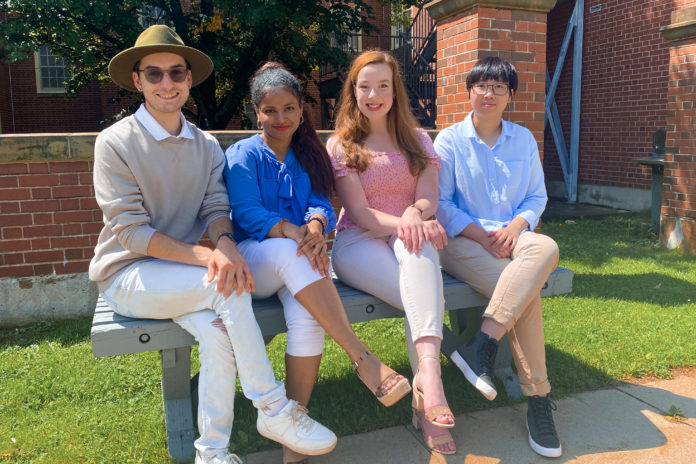

The St. Thomas University Students’ Union is finding solutions to student engagement while temporarily online. Tyler MaGee, STUSU’s president, said STUSU had to come up with different plans depending on whether or not classes stay online.
“If we stay online, we will be diving into policy, because there’s not a whole lot that we’re able to do to directly engage with students in the way that we traditionally see student engagement,” said MaGee.
Still, MaGee recognizes the achievements STUSU had during the summer and the fall semester.
“Throughout the summer, we managed to achieve a lot of the admin goals that we had. So we’ve restructured our website, we’ve introduced new programs [and] budgetary stuff,” said MaGee. “I’m delighted to say that we did achieve a lot of what was in [the STUSU priorities document], namely on the campus engagement.”
STUSU speaking on behalf of STU students during advocacy week
The advocacy week of the Canadian Alliance of Student Associations (CASA) starts on Feb. 14. CASA’s advocacy week is attended by student leaders from all around the country to advocate for positive changes to the federal government on behalf of students.
Sydona Chandon, STUSU’s vice-president education and CASA’s primary delegate, said she will bring forward different student priorities to the members of parliament, senators and stakeholders.
“In my position as [vice-president education], I work with [CASA] by bringing forward student matters on a federal level,” she said. “This semester, I will continue my role by supporting initiatives that are put on by CASA.”
She will advocate for maintaining current funding levels to Canada Student Grants past the 2022-23 school year. Chandon also hopes to permanently double grant maximums for eligible students from $3,000 to $6,000 per academic year.
She wants to implement the initiation of a pan-Canadian strategy on mental illness detection, prevention and intervention for post-secondary students.
Chandon is also working on the establishment of a national network to share information and best practices per Truth and Reconciliation Commission Call to Action #66.
“We are continuously working with the [New Brunswick Student’s Alliance] and CASA to advocate on behalf of all students here at STU,” said Chandon.
Affirmative Action Bursaries
MaGee and Chandon had plans to go to Ottawa for CASA’s conference, but this event was moved online, which left STUSU with available funds.
Alex Nguyen, STUSU’s vice-president administration, said these funds, alongside other sources, were used to create the Affirmative Action Bursaries, which will give $1,000 to 10 recipients.
“I’m really proud that we were able to have something like this this year,” said Nguyen. “Students really need the financial assistance.”
The STUSU Affirmative Action Bursaries provide financial assistance to students for tuition-related purposes and it prioritizes international students, Indigenous students, students with visible and invisible disabilities, members of other racially visible groups, 2SLGBTQIA+ students, students with dependents and students from a single-parent income.
Nguyen received around 10 applications in the first two days of the bursary and expects more submissions before the deadline on Feb. 18.
STUSU’s mental health week goes online
Victoria Young, STUSU’s vice-president student life, said she had to change mental health week to be possible in an online format.
“[Mental health week] would have been in-person but we’re going to adapt that to be online as well and have some online initiatives because mental health is very important at a time like this,” she said.
To overcome the pressure of making online events for mental health, Young said STUSU has “figured out” a power-sharing agreement with Jack.org, a non-profit organization focused on youth mental health and suicide prevention.
“[Jack.org] will bring a really fresh perspective and fresh ideas to the types of initiatives that we do on campus,” said Young. “A lot of those initiatives can be delivered virtually – speakers, online campaigns and a lot of other really cool initiatives that [Jack.org] can help us out with.”
Even with all of the uncertainty involving the winter semester, MaGee understands students are the most affected by the circumstances.
“Hang in there … I know it’s challenging. I know it’s tough. I have received student emails expressing their dismay … but I encourage you to use [STUSU’s] resources,” said MaGee.
